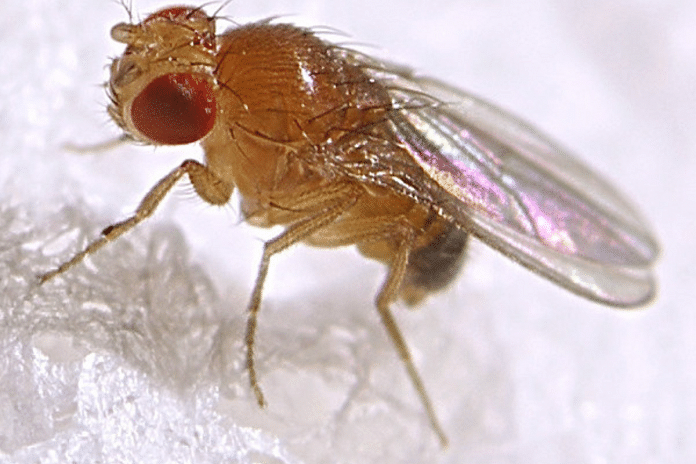New Delhi: Fruit flies have a unique taste receptor that allows them to detect alkaline or high pH foods and surfaces, enabling them to avoid substances that may be toxic to them, new research has discovered.
Scientists at the Monell Chemical Senses Center in Philadelphia, USA, found that the fruit fly (Drosophila melanogaster), considered a model organism for studying taste, could tell the difference between neutral and alkaline foods — those with pH levels over 7.
Animals’ dietary choices are influenced by their sense of taste. Food contains various acids and bases, and pH is a metric that indicates the acidity or alkalinity of a substance.
In a blog post about the study, Yali Zhang, principal investigator at the Monell Chemical Senses Center and one of the authors, explained that “many important biological processes only occur at particular pH levels”. Consequently, pH perception can help animals differentiate between nutritious and potentially harmful foods.
The study, which was published on 20 March in Nature Metabolism, found that given a choice between neutral food with pH 7 — which is neither acidic nor basic — and alkaline food with pH12, the fruit fly chose the neutral food and actively avoided the alkaline one.
The study is an important breakthrough given that high pH substances have adverse effects on the development, survival, and lifespan of flies.
The researchers further discovered a gene called alkaliphile (alka) in these flies that was responsible for detecting alkaline substances. According to the study, alka is both necessary and sufficient for aversive taste responses to basic food.
The gene encodes a chloride channel that is activated by an alkaline pH and is expressed in the neurons called the gustatory receptor, which helps identify flavours.
The research will be beneficial for understanding adaptation techniques in fruit flies, as sensing alkaline substances would help them avoid ingesting toxic substances, the authors suggest. Moreover, it can also serve as a foundation for future research on alkaline taste in other animals.
Also Read: The enigma inside our heads — scientists unlock new secrets as brain research deepens
Do other animals have alkaline taste?
Whether or not animals have a taste mechanism to perceive the basicity, or high pH, of food has long been an open subject of debate though there is a widespread belief that a sour taste to detect the acidity of the food. While acid taste receptors have been identified, base taste receptors have not.
Previous research has found that cats have taste nerves that are activated by high pH, and insects like beetles have been found to actively avoid alkaline environments.
Several species, including nematodes, insects, fish, and mammals have well-defined behavioural responses to alkaline pH, previous research has showed.
Flies in general have a “remarkable capability to detect a wide range of substances through taste”, which also allows them to taste the alkalinity of food, the authors suggested.
Like mammals, the fruit fly also employs different classes of taste receptors to detect sugars, salts, acids, and bitter substances.
Also Read: Study finds SAARC members have better scientific collaboration with others, India leads pack
How does it help?
Although the ideal physiological activities and enzymatic reactions of most organisms may only occur within a small pH range (about 7.4), an excessively high pH can disrupt the acid–base balance and cause alkalosis, a potentially fatal condition, the researchers explained.
Throughout their ecology, organisms may experience high pH values in numerous situations, such as in the food and water they ingest.
For the study, the researchers used NaOH (Sodium hydroxide) to alter the food pH since it dissociates entirely once dissolved and also has lower side effects on flies.
The researchers found that the fruit flies were “repelled by basic food”, indicating that they detected food basicity through specific taste receptors, which were very likely to be transmembrane receptors. Findings suggest that alka gene was likely a direct sensor for high pH.
The effects of alkaline pH on the physiology of flies have been thoroughly documented in numerous research, the study stated. It has been reported that the pH of the fly’s body undergoes a dynamic change during development from larval to pupal and adult stages.
Hence, the alkaline pH sense is closely associated with the health and longevity of flies. According to the study, the lifetime and survival of flies, if fed moderately alkaline diets, gets lowered by 80 per cent.
In addition, persistent exposure to a very alkaline environment impairs development, reduces longevity, and results in death. Therefore, female flies strongly avoid alkaline substrates when deciding where to lay eggs.
Alkaline pH sense is a crucial self-defense mechanism that enables flies and other animals to avoid harmful surroundings during food seeking and habitat selection.
The study, therefore, suggests that alkaline taste significantly improves the evolutionary fitness of flies by promoting their survival, development, and reproduction.
(Edited by Richa Mishra)
Also Read: Is your blood type A? You may face higher risk of a stroke early in life, find US researchers



